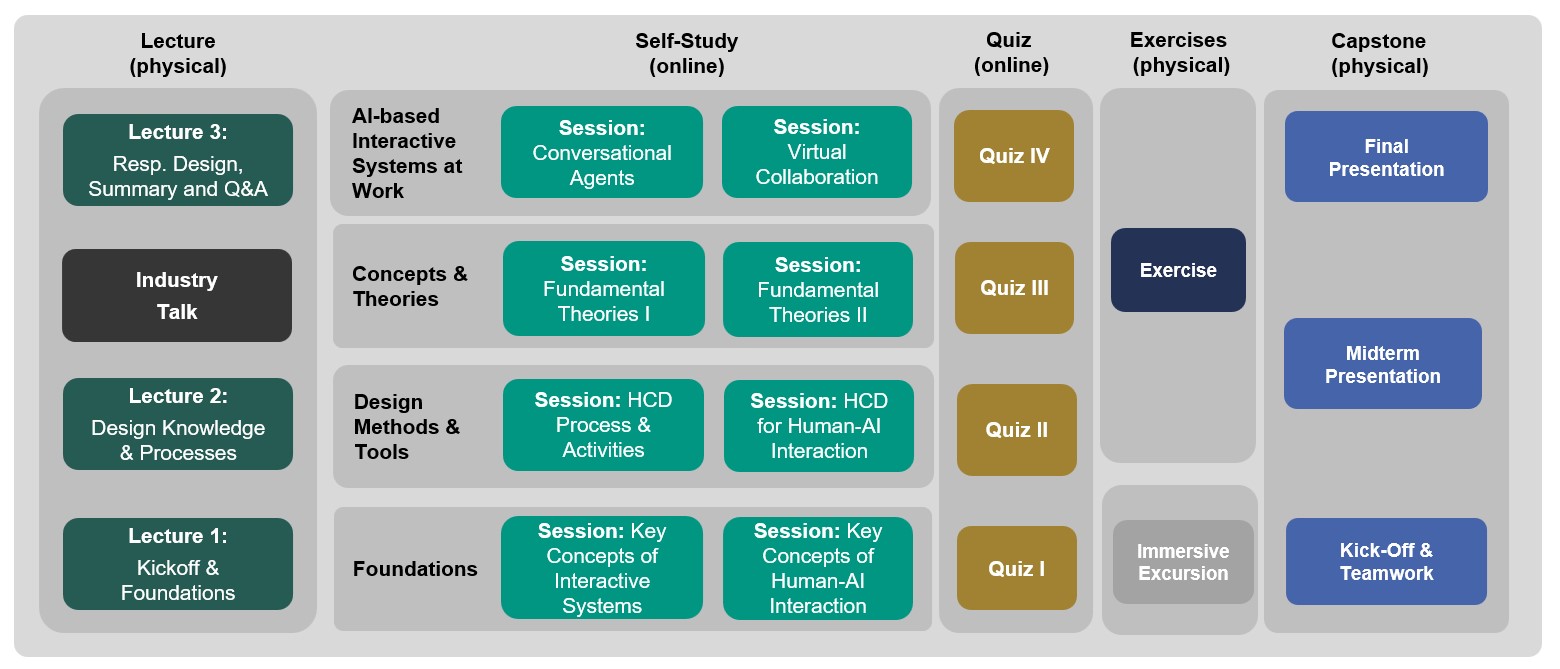Designing Interactive Systems: Human-AI Interaction
- Type: Lecture (V)
- Semester: SS 2024
-
Time:
Thu 2024-04-18
11:30 - 13:00, weekly
10.11 Raum 213 ( Ersatzraum für Raum 103.2 Geb. 20.14 )
10.11 Verwaltungsgebäude, Hauptbau (2. OG)
Thu 2024-04-25
11:30 - 13:00, weekly
10.11 Raum 213 ( Ersatzraum für Raum 103.2 Geb. 20.14 )
10.11 Verwaltungsgebäude, Hauptbau (2. OG)
Thu 2024-05-02
11:30 - 13:00, weekly
10.11 Raum 213 ( Ersatzraum für Raum 103.2 Geb. 20.14 )
10.11 Verwaltungsgebäude, Hauptbau (2. OG)
Thu 2024-05-16
11:30 - 13:00, weekly
10.11 Raum 213 ( Ersatzraum für Raum 103.2 Geb. 20.14 )
10.11 Verwaltungsgebäude, Hauptbau (2. OG)
Thu 2024-06-06
11:30 - 13:00, weekly
10.11 Raum 213 ( Ersatzraum für Raum 103.2 Geb. 20.14 )
10.11 Verwaltungsgebäude, Hauptbau (2. OG)
Thu 2024-06-13
11:30 - 13:00, weekly
10.11 Raum 213 ( Ersatzraum für Raum 103.2 Geb. 20.14 )
10.11 Verwaltungsgebäude, Hauptbau (2. OG)
Thu 2024-06-20
11:30 - 13:00, weekly
10.11 Raum 213 ( Ersatzraum für Raum 103.2 Geb. 20.14 )
10.11 Verwaltungsgebäude, Hauptbau (2. OG)
Thu 2024-06-27
11:30 - 13:00, weekly
10.11 Raum 213 ( Ersatzraum für Raum 103.2 Geb. 20.14 )
10.11 Verwaltungsgebäude, Hauptbau (2. OG)
Thu 2024-07-04
11:30 - 13:00, weekly
10.11 Raum 213 ( Ersatzraum für Raum 103.2 Geb. 20.14 )
10.11 Verwaltungsgebäude, Hauptbau (2. OG)
Thu 2024-07-11
11:30 - 13:00, weekly
10.11 Raum 213 ( Ersatzraum für Raum 103.2 Geb. 20.14 )
10.11 Verwaltungsgebäude, Hauptbau (2. OG)
Thu 2024-07-18
11:30 - 13:00, weekly
10.11 Raum 213 ( Ersatzraum für Raum 103.2 Geb. 20.14 )
10.11 Verwaltungsgebäude, Hauptbau (2. OG)
Thu 2024-07-25
11:30 - 13:00, weekly
10.11 Raum 213 ( Ersatzraum für Raum 103.2 Geb. 20.14 )
10.11 Verwaltungsgebäude, Hauptbau (2. OG)
-
Lecturer:
Prof. Dr. Alexander Mädche
Julia Seitz - SWS: 3
- Lv-No.: 2540558
- Information: Blended (On-Site/Online)
Content Description:
Computers have evolved from batch processors towards highly interactive systems. With the rapid progress in the field of artificial intelligence, computers can now learn and adapt to their environment, simulate human intelligence processes as well as support or even take over tasks from humans. This offers great possibilities, but at the same time raises new challenges for the successful design of interactive systems.
The aim of this course is to introduce advanced concepts and theories as well as current practice of designing interactive systems. A specific focus is set on designing AI-based interactive systems for individuals and groups at work ranging from personal productivity assistants to AI-augmented virtual collaboration. The course is complemented with hands-on exercises and a design capstone project in cooperation with an industry partner. In the project, students in a team effort apply state-of-the-art design methods & techniques and create an interactive system design prototype with a specific focus on human-AI interaction.

Learning objectives:
- Explain what interactive systems are and how they can be conceptualized
- Describe the unique characteristics of human-AI interaction and their impact on designing interactive systems
- Understand the human-centered design process and know how to apply corresponding methods and tools
- Understand the concepts and theoretical foundations that guide the design of interactive systems
- Know key concepts, design principles and design methods for contemporary interactive systems focusing on on human-AI interaction
- Get hands-on experience by applying lecture content in a design capstone project
Capstone Project
The students analyse a real-world challenge provided by our partner EnBW AG and design innovative prototypes based on the lecture content. Students do not only gain hands-on experience with various prototyping tools, but can also improve their project management and collaboration skills.
For a detailed insight into previous students work, you can watch the videos of all prototypes on our Youtube-Channel.
Registration & Organization
Please note: This course is limited to a capacity of 50 places. The capacity limitation is due to the attractive format of the accompanying capstone project. Students have to apply with their CV and transcript of records via Yousubscribe after the kickoff session. The capstone project is a group assignment, students are allocated to teams based on their skills and preferences. The language of instruction is English. Further organizational details of the lecture and the capstone project will be presented in the kick-off session of the lecture.
More information (e.g. schedule for lecture and exercises, zoom links) will be posted in advance in the ILIAS course of the lecture.
Contact: Julia Seitz

